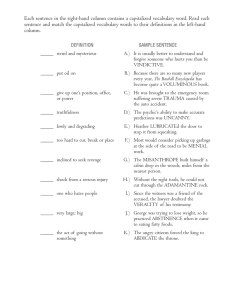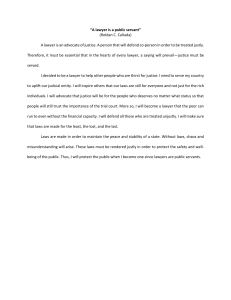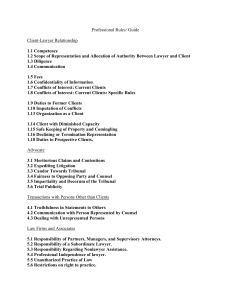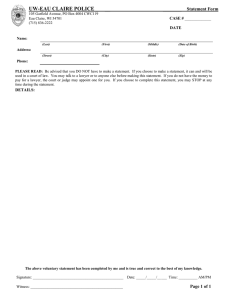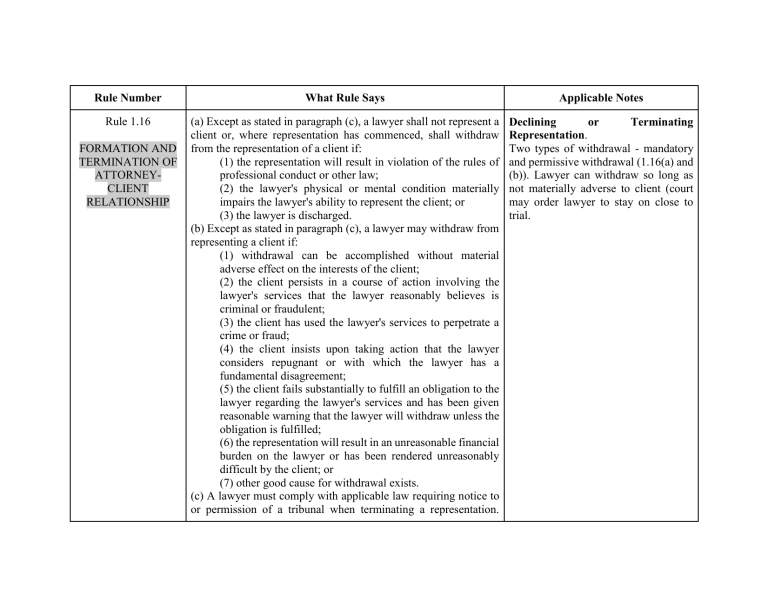
Rule Number What Rule Says Applicable Notes Rule 1.16 (a) Except as stated in paragraph (c), a lawyer shall not represent a client or, where representation has commenced, shall withdraw from the representation of a client if: (1) the representation will result in violation of the rules of professional conduct or other law; (2) the lawyer's physical or mental condition materially impairs the lawyer's ability to represent the client; or (3) the lawyer is discharged. (b) Except as stated in paragraph (c), a lawyer may withdraw from representing a client if: (1) withdrawal can be accomplished without material adverse effect on the interests of the client; (2) the client persists in a course of action involving the lawyer's services that the lawyer reasonably believes is criminal or fraudulent; (3) the client has used the lawyer's services to perpetrate a crime or fraud; (4) the client insists upon taking action that the lawyer considers repugnant or with which the lawyer has a fundamental disagreement; (5) the client fails substantially to fulfill an obligation to the lawyer regarding the lawyer's services and has been given reasonable warning that the lawyer will withdraw unless the obligation is fulfilled; (6) the representation will result in an unreasonable financial burden on the lawyer or has been rendered unreasonably difficult by the client; or (7) other good cause for withdrawal exists. (c) A lawyer must comply with applicable law requiring notice to or permission of a tribunal when terminating a representation. Declining or Terminating Representation. Two types of withdrawal - mandatory and permissive withdrawal (1.16(a) and (b)). Lawyer can withdraw so long as not materially adverse to client (court may order lawyer to stay on close to trial. FORMATION AND TERMINATION OF ATTORNEYCLIENT RELATIONSHIP When ordered to do so by a tribunal, a lawyer shall continue representation notwithstanding good cause for terminating the representation. (d) Upon termination of representation, a lawyer shall take steps to the extent reasonably practicable to protect a client's interests, such as giving reasonable notice to the client, allowing time for employment of other counsel, surrendering papers and property to which the client is entitled and refunding any advance payment of fee or expense that has not been earned or incurred. The lawyer may retain papers relating to the client to the extent permitted by other law. Rule 1.1 DUTIES LAWYERS OWE: COMPETENCE Rule 1.2 SCOPE OF REPRESENTATION A lawyer shall provide competent representation to a client. Competent representation requires the legal knowledge, skill, thoroughness and preparation reasonably necessary for the representation. Duty of Competence. Note - there are other rules that deal with duties that sometimes fall under this umbrella (i.e. Duty of Communication). Those are going to be in separate rules. (a) Subject to paragraphs (c) and (d), a lawyer shall abide by a client's decisions concerning the objectives of representation and, as required by Rule 1.4, shall consult with the client as to the means by which they are to be pursued. A lawyer may take such action on behalf of the client as is impliedly authorized to carry out the representation. A lawyer shall abide by a client's decision whether to settle a matter. In a criminal case, the lawyer shall abide by the client's decision, after consultation with the lawyer, as to a plea to be entered, whether to waive jury trial and whether the client will testify. (b) A lawyer's representation of a client, including representation by appointment, does not constitute an endorsement of the client's political, economic, social or moral views or activities. (c) A lawyer may limit the scope of the representation if the limitation is reasonable under the circumstances and the client Scope of the Representation. Basically, clients control the objectives, but lawyers control the means to get there. This also encompasses the crime-fraud exception, and how a lawyer may limit representation. gives informed consent. (d) A lawyer shall not counsel a client to engage, or assist a client, in conduct that the lawyer knows is criminal or fraudulent, but a lawyer may discuss the legal consequences of any proposed course of conduct with a client and may counsel or assist a client to make a good faith effort to determine the validity, scope, meaning or application of the law. Rule 1.3 DUTY OF LOYALTY AND DILIGENCE Rule 1.4 DUTY TO INFORM AND ADVISE/DUTY OF COMMUNICATION A lawyer shall act with reasonable diligence and promptness in Duty of Diligence. The most common representing a client fact pattern will be when a lawyer starts working on a client, then doesn’t do anything as litigation proceeds. Normally, it will involve a lawyer lying to client. I’m unsure about what potential remedies would be. (a) A lawyer shall: (1) promptly inform the client of any decision or circumstance with respect to which the client's informed consent, as defined in Rule 1.0(e), is required by these Rules; (2) reasonably consult with the client about the means by which the client's objectives are to be accomplished; (3) keep the client reasonably informed about the status of the matter; (4) promptly comply with reasonable requests for information; and (5) consult with the client about any relevant limitation on the lawyer's conduct when the lawyer knows that the client expects assistance not permitted by the Rules of Professional Conduct or other law. (b) A lawyer shall explain a matter to the extent reasonably necessary to permit the client to make informed decisions regarding the representation. Duty of Communication - Basically, keep your client informed, consult with them on major decisions, and answer their requests when they ask for stuff. Rule 1.6, 1.13(a), (c),(d) RULE 1.6 - Confidentiality of Information (a) A lawyer shall not reveal information relating to the CONFIDENTIALITY representation of a client unless the client gives informed consent, the disclosure is impliedly authorized in order to carry out the representation or the disclosure is permitted by paragraph (b). (b) A lawyer may reveal information relating to the representation of a client to the extent the lawyer reasonably believes necessary: (1) to prevent reasonably certain death or substantial bodily harm; (2) to prevent the client from committing a crime or fraud that is reasonably certain to result in substantial injury to the financial interests or property of another and in furtherance of which the client has used or is using the lawyer's services; Duty of Confidentiality - Exam Tips Conflicts Analysis Questions (1) What is the source of the conflict (thirdparty, multiple client, lawyer’s interests? (2) Does the conflict meets the rule’s particular requirements? (3) Is the conflict imputed to the entire organization? (4) If so, can the lawyer be effectively screened or isolated by the law firm? (5) Is the conflict one that allows for a client waiver? (6) If so, what must occur for the waiver to be effective? If a lawyer moves on without informed consent, they may be liable for discipline. (3) to prevent, mitigate or rectify substantial injury to the financial interests or property of another that is reasonably certain to result or has resulted from the client's commission of a crime or Conflict Fact Patterns Third Party Interference - Rule 1.7(a)(2) for fraud in furtherance of which the client has used the lawyer's the general rule. Conflict can be waived by services; (4) to secure legal advice about the lawyer's compliance with these Rules; informed consent. Common fact pattern is when a third-party tries to pay the defendant’s attorney fees. Rule 1.8(f) for the specific rule. (5) to establish a claim or defense on behalf of the lawyer in a controversy between the lawyer and the client, to establish a defense to a criminal charge or civil claim against the lawyer based upon conduct in which the client was involved, or to respond to allegations in any proceeding concerning the lawyer's representation of the client; Lawyer v. Client- Waiver of such a conflict is possible if the lawyer reasonably believes they will be able to give effective representation and the client gives informed (6) to comply with other law or a court order; or (7) to detect and resolve conflicts of interest arising from the lawyer’s change of employment or from changes in the composition or ownership of a firm, but only if the revealed information would not compromise the attorney-client privilege or otherwise prejudice the client. (c) A lawyer shall make reasonable efforts to prevent the inadvertent or unauthorized disclosure of, or unauthorized access to, information relating to the representation of a client. RULE 1.13(a), (c), (d) - Organizations as a Client (a) A lawyer employed or retained by an organization represents the organization acting through its duly authorized constituents. (c) Except as provided in paragraph (d), if (1) despite the lawyer's efforts in accordance with paragraph (b) the highest authority that can act on behalf of the organization insists upon or fails to address in a timely and appropriate manner an action, or a refusal to act, that is clearly a violation of law, and (2) the lawyer reasonably believes that the violation is reasonably certain to result in substantial injury to the organization, then the lawyer may reveal information relating to the representation whether or not Rule 1.6 permits such disclosure, but only if and to the extent the lawyer reasonably believes necessary to prevent substantial injury to the organization. (d) Paragraph (c) shall not apply with respect to information relating to a lawyer's representation of an organization to consent. Business transactions with clients - Rule 1.8(a). Multiple Clients - Direct adversity cannot be waived. A lawyer representing one client against another client in a matter unrelated to the representation of that second client cannot be waived, unless the conflict is general. Watch out for fact patterns where a prospective clients give confidential information to a lawyer, then decides not to hire that lawyer. Imputation & Motions to Disqualify - There are other factors - which I have no idea about - which the court takes into account when deciding what to do on a motion to disqualify. Expand zee answer. Definitely going to be an imputation question, with a lawyer moving between law firms. Be ready for that. investigate an alleged violation of law, or to defend the organization or an officer, employee or other constituent associated with the organization against a claim arising out of an alleged violation of law. Rule 1.7 CONCURRENT CONFLICTS OF INTEREST Rule 1.8 SPECIFIC CONCURRENT CONFLICTS OF (a) Except as provided in paragraph (b), a lawyer shall not represent Notes a client if the representation involves a concurrent conflict of ● Easy for a client to give interest. A concurrent conflict of interest exists if: informed consent to a waiver of ● (1) the representation of one client will be directly adverse the duty of loyalty, but hard for to another client; or duty of confidentiality. ● (2) there is a significant risk that the representation of one or more clients will be materially limited by the lawyer's ● If you’re representing two responsibilities to another client, a former client or a third adverse clients in separate person or by a personal interest of the lawyer. Only concern matters, can’t drop one for the is about legal adversity, not economic adversity . other (Hot Potato Doctrine) (b) Notwithstanding the existence of a concurrent conflict of interest under paragraph (a), a lawyer may represent a client if: ● You cannot have positional ● (1) the lawyer reasonably believes that the lawyer will be conflicts of interest (i.e. you can able to provide competent and diligent representation to argue one legal argument for a each affected client; client in one district and argue a ● (2) the representation is not prohibited by law; contradictory one for another ● (3) the representation does not involve the assertion of a client somewhere else). claim by one client against another client represented by the lawyer in the same litigation or other proceeding before a tribunal; and ● (4) each affected client gives informed consent, confirmed in writing. (a) A lawyer shall not enter into a business transaction with a client or knowingly acquire an ownership, possessory, security or other pecuniary interest adverse to a client unless: INTEREST (1) the transaction and terms on which the lawyer acquires the interest are fair and reasonable to the client and are fully disclosed and transmitted in writing in a manner that can be reasonably understood by the client; (2) the client is advised in writing of the desirability of seeking and is given a reasonable opportunity to seek the advice of independent legal counsel on the transaction; and (3) the client gives informed consent, in a writing signed by the client, to the essential terms of the transaction and the lawyer's role in the transaction, including whether the lawyer is representing the client in the transaction. (b) A lawyer shall not use information relating to representation of a client to the disadvantage of the client unless the client gives informed consent, except as permitted or required by these Rules. (c) A lawyer shall not solicit any substantial gift from a client, including a testamentary gift, or prepare on behalf of a client an instrument giving the lawyer or a person related to the lawyer any substantial gift unless the lawyer or other recipient of the gift is related to the client. For purposes of this paragraph, related persons include a spouse, child, grandchild, parent, grandparent or other relative or individual with whom the lawyer or the client maintains a close, familial relationship. (d) Prior to the conclusion of representation of a client, a lawyer shall not make or negotiate an agreement giving the lawyer literary or media rights to a portrayal or account based in substantial part on information relating to the representation. (e) A lawyer shall not provide financial assistance to a client in connection with pending or contemplated litigation, except that: (1) a lawyer may advance court costs and expenses of litigation, the repayment of which may be contingent on the outcome of the matter; and (2) a lawyer representing an indigent client may pay court costs and expenses of litigation on behalf of the client. (f) A lawyer shall not accept compensation for representing a client from one other than the client unless: (1) the client gives informed consent; (2) there is no interference with the lawyer's independence of professional judgment or with the client-lawyer relationship; and (3) information relating to representation of a client is protected as required by Rule 1.6. (g) A lawyer who represents two or more clients shall not participate in making an aggregate settlement of the claims of or against the clients, or in a criminal case an aggregated agreement as to guilty or nolo contendere pleas, unless each client gives informed consent, in a writing signed by the client. The lawyer's disclosure shall include the existence and nature of all the claims or pleas involved and of the participation of each person in the settlement. (h) A lawyer shall not: (1) make an agreement prospectively limiting the lawyer's liability to a client for malpractice unless the client is independently represented in making the agreement; or (2) settle a claim or potential claim for such liability with an unrepresented client or former client unless that person is advised in writing of the desirability of seeking and is given a reasonable opportunity to seek the advice of independent legal counsel in connection therewith. (i) A lawyer shall not acquire a proprietary interest in the cause of action or subject matter of litigation the lawyer is conducting for a client, except that the lawyer may: (1) acquire a lien authorized by law to secure the lawyer's fee or expenses; and (2) contract with a client for a reasonable contingent fee in a civil case. (j) A lawyer shall not have sexual relations with a client unless a consensual sexual relationship existed between them when the client-lawyer relationship commenced. (k) While lawyers are associated in a firm, a prohibition in the foregoing paragraphs (a) through (i) that applies to any one of them shall apply to all of them. Rule 1.9 SUCCESSIVE CONFLICTS OF INTEREST Duties to Former Clients (a) A lawyer who has formerly represented a client in a matter shall not thereafter represent another person in the same or a substantially related matter in which that person's interests are materially adverse to the interests of the former client unless the former client gives informed consent, confirmed in writing. (b) A lawyer shall not knowingly represent a person in the same or a substantially related matter in which a firm with which the lawyer formerly was associated had previously represented a client (1) whose interests are materially adverse to that person; and (2) about whom the lawyer had acquired information protected by Rules 1.6 and 1.9(c) that is material to the matter; unless the former client gives informed consent, confirmed in writing. (c) A lawyer who has formerly represented a client in a matter or whose present or former firm has formerly represented a client in a matter shall not thereafter: (1) use information relating to the representation to the disadvantage of the former client except as these Rules would permit or require with respect to a client, or when the information has become generally known; or (2) reveal information relating to the representation except as these Rules would permit or require with respect to a client. Rule 1.10 IMPUTATION (a) While lawyers are associated in a firm, none of them shall knowingly represent a client when any one of them practicing alone would be prohibited from doing so by Rules 1.7 or 1.9, unless (1) the prohibition is based on a personal interest of the disqualified lawyer and does not present a significant risk of materially limiting the representation of the client by the remaining lawyers in the firm; or (2) the prohibition is based upon Rule 1.9(a) or (b) and arises out of the disqualified lawyer’s association with a prior firm, and (i) the disqualified lawyer is timely screened from any participation in the matter and is apportioned no part of the fee therefrom; (ii) written notice is promptly given to any affected Seventh Circuit’s Imputation Disqualification Test Three Step Disqualification Test (7th Cir.) (1) Substantial relationship between the subject matter of the prior and current suit. (2) Presumption of shared confidences has been rebutted for prior (irrebuttable presumption) Did the lawyer share confidences of the former client on matter while working at the former firm? former client to enable the former client to ascertain compliance with the provisions of this Rule, which shall include a description of the screening procedures employed; a statement of the firm's and of the screened lawyer's compliance with these Rules; a statement that review may be available before a tribunal; and an agreement by the firm to respond promptly to any written inquiries or objections by the former client about the screening procedures; and (iii) certifications of compliance with these Rules and with the screening procedures are provided to the former client by the screened lawyer and by a partner of the firm, at reasonable intervals upon the former client's written request and upon termination of the screening procedures. (b) When a lawyer has terminated an association with a firm, the firm is not prohibited from thereafter representing a person with interests materially adverse to those of a client represented by the formerly associated lawyer and not currently represented by the firm, unless: (1) the matter is the same or substantially related to that in which the formerly associated lawyer represented the client; and (2) any lawyer remaining in the firm has information protected by Rules 1.6 and 1.9(c) that is material to the matter. (c) A disqualification prescribed by this rule may be waived by the affected client under the conditions stated in Rule 1.7. It is only rebuttable when the lawyer transitions to another firm, not when the lawyer stays at the same firm. Proof that he had no confidential information of prior client Screening process was timely deployed so that lawyer learned nothing Instructions given to form about the lawyers recusal and ban of info Prohibited access to files in the case Locked file cases Secret codes necessary to get onto electronic hardware Prohibited sharing of fees derived from such litigation (3) Presumption of shared confidences has been rebutted for current law firm. Have the lawyers at the new firm received confidences of the former client from the new lawyer after the new lawyer gets there. (d) The disqualification of lawyers associated in a firm with former or current government lawyers is governed by Rule 1.11. Rule 1.18 DUTIES TOWARD PROSPECTIVE CLIENTS (a) A person who consults with a lawyer about the possibility of forming a client-lawyer relationship with respect to a matter is a prospective client. (b) Even when no client-lawyer relationship ensues, a lawyer who has learned information from a prospective client shall not use or reveal that information, except as Rule 1.9 would permit with respect to information of a former client. (c) A lawyer subject to paragraph (b) shall not represent a client with interests materially adverse to those of a prospective client in the same or a substantially related matter if the lawyer received information from the prospective client that could be significantly harmful to that person in the matter, except as provided in paragraph (d). If a lawyer is disqualified from representation under this paragraph, no lawyer in a firm with which that lawyer is associated may knowingly undertake or continue representation in such a matter, except as provided in paragraph (d). (d) When the lawyer has received disqualifying information as defined in paragraph (c), representation is permissible if: (1) both the affected client and the prospective client have given informed consent, confirmed in writing, or: (2) the lawyer who received the information took reasonable measures to avoid exposure to more disqualifying information than was reasonably necessary to determine whether to represent the prospective client; and (i) the disqualified lawyer is timely screened from any participation in the matter and is apportioned no part of the fee therefrom; and (ii) written notice is promptly given to the prospective client. Rule 3.3 CANDOR TOWARDS THE TRIBUNAL a) A lawyer shall not knowingly: (1) make a false statement of fact or law to a tribunal or fail to correct a false statement of material fact or law previously made to the tribunal by the lawyer; (2) fail to disclose to the tribunal legal authority in the controlling jurisdiction known to the lawyer to be directly adverse to the position of the client and not disclosed by opposing counsel; or (3) offer evidence that the lawyer knows to be false. If a lawyer, the lawyer’s client, or a witness called by the lawyer, has offered material evidence and the lawyer comes to know of its falsity, the lawyer shall take reasonable remedial measures, including, if necessary, disclosure to the tribunal. A lawyer may refuse to offer evidence, other than the testimony of a defendant in a criminal matter, that the lawyer reasonably believes is false. (b) A lawyer who represents a client in an adjudicative proceeding and who knows that a person intends to engage, is engaging or has engaged in criminal or fraudulent conduct related to the proceeding shall take reasonable remedial measures, including, if necessary, disclosure to the tribunal. (c) The duties stated in paragraphs (a) and (b) continue to the conclusion of the proceeding, and apply even if compliance requires disclosure of information otherwise protected by Rule 1.6. (d) In an ex parte proceeding, a lawyer shall inform the tribunal of all material facts known to the lawyer that will enable the tribunal to make an informed decision, whether or not the facts are adverse. Rule 3.7 LAWYER AS A WITNESS Rule 4.2 INTERACTIONS WITH OTHER PARTIES Rule 4.4 INADVERTENTLY SENDING MATERIAL (a) A lawyer shall not act as advocate at a trial in which the lawyer is likely to be a necessary witness unless: (1) the testimony relates to an uncontested issue; (2) the testimony relates to the nature and value of legal services rendered in the case; or (3) disqualification of the lawyer would work substantial hardship on the client. (b) A lawyer may act as advocate in a trial in which another lawyer in the lawyer's firm is likely to be called as a witness unless precluded from doing so by Rule 1.7 or Rule 1.9. In representing a client, a lawyer shall not communicate about the subject of the representation with a person the lawyer knows to be represented by another lawyer in the matter, unless the lawyer has the consent of the other lawyer or is authorized to do so by law or a court order. (a) In representing a client, a lawyer shall not use means that have no substantial purpose other than to embarrass, delay, or burden a third person, or use methods of obtaining evidence that violate the legal rights of such a person. (b) A lawyer who receives a document or electronically stored information relating to the representation of the lawyer's client and knows or reasonably should know that the document or Section B of this rule is the most likely to be tested. Jurisdictions differ on what an attorney should do when they receive an email from their opponent. Most of the time, the attorney should not look at the material, notify the sender, and send the information back. In jurisdictions electronically stored information was inadvertently sent shall that don’t follow the ABA, some allow promptly notify the sender. the attorney to look at the paper, and the privilege is waived. ● Rule 5.5 ○ (a) A lawyer shall not practice law in a jurisdiction in violation of the regulation of the legal profession in that jurisdiction, or assist another in doing so. ○ (b) A lawyer who is not admitted to practice in this jurisdiction shall not: ■ (1) except as authorized by these Rules or other law, establish an office or other systematic and continuous presence in this jurisdiction for the practice of law; or ■ (2) hold out to the public or otherwise represent that the lawyer is admitted to practice law in this jurisdiction. ○ (c) A lawyer admitted in another United States jurisdiction, and not disbarred or suspended from practice in any jurisdiction, may provide legal services on a temporary basis in this jurisdiction that: ■ (1) are undertaken in association with a lawyer who is admitted to practice in this jurisdiction and who actively participates in the matter; ■ (2) are in or reasonably related to a pending or potential proceeding before a tribunal in this or another jurisdiction, if the lawyer, or a person the lawyer is assisting, is authorized by law or order to appear in such proceeding or reasonably expects to be so authorized; ■ (3) are in or reasonably related to a pending or potential arbitration, mediation, or other alternative resolution proceeding in this or another jurisdiction, if the services arise out of or are reasonably related to the lawyer's practice in a jurisdiction in which the lawyer is admitted to practice and are not services for which the forum requires pro hac vice admission; or ■ (4) are not within paragraphs (c) (2) or (c)(3) and arise out of or are reasonably related to the lawyer's practice in a jurisdiction in which the lawyer is admitted to practice. ○ (d) A lawyer admitted in another United States jurisdiction or in a foreign jurisdiction, and not disbarred or suspended from practice in any jurisdiction or the equivalent thereof, or a person otherwise lawfully practicing as an in-house counsel under the laws of a foreign jurisdiction, may provide legal services through an office or other systematic and continuous presence in this jurisdiction that: ■ (1) are provided to the lawyer's employer or its organizational affiliates, are not services for which the forum requires pro hac vice admission; and when performed by a foreign lawyer and requires advice on the law of this or another U.S. jurisdiction or of the United States, such advice shall be based upon the advice of a lawyer who is duly licensed and authorized by the jurisdiction to provide such advice; or ■ (2) are services that the lawyer is authorized by federal or other law or rule to provide in this jurisdiction. ○ (e) For purposes of paragraph (d): ■ (1) the foreign lawyer must be a member in good standing of a recognized legal profession in a foreign jurisdiction, the members of which are admitted to practice as lawyers or counselors at law or the equivalent, and subject to effective regulation and discipline by a duly constituted professional body or a public authority; or, ■ (2) the person otherwise lawfully practicing as an in-house counsel under the laws of a foreign jurisdiction must be authorized to practice under this Rule by, in the exercise of its discretion, [the highest court of this jurisdiction].



